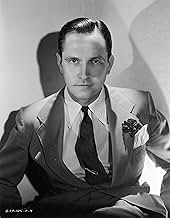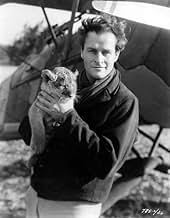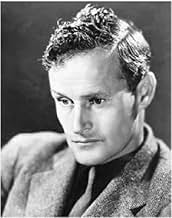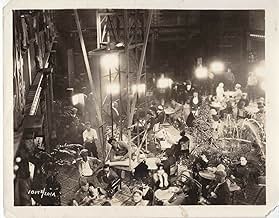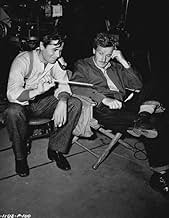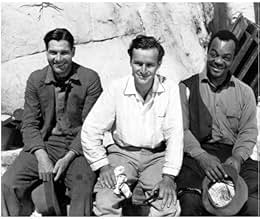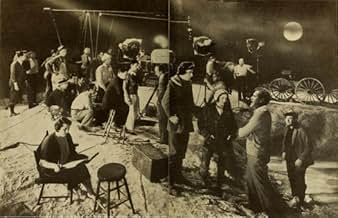William A. Wellman(1896-1975)
- Director
- Writer
- Producer
William Wellman, the Oscar-winning screenwriter-director of the
original Une étoile est née (1937),
was called "Wild Bill" during his World War I service as an aviator, a
nickname that persisted in Hollywood due to his larger-than-life
personality and lifestyle.
A leap-year baby born in 1896 on the 29th of February in Brookline, MA, Wellman was the great-great-great grandson of Francis Lewis, one of the men who signed the Declaration of Independence. Wellman's father was a stockbroker and his mother, the former Cecilia McCarthy, was born in Ireland. Despite an upper-middle-class upbringing, the young Wellman was a hell-raiser. He excelled as an athlete and particularly enjoyed playing ice hockey, but he also enjoyed joyriding in stolen cars at nights.
Cecilia Wellman served as a probation officer for "wayward boys" (juvenile delinquents) for the Commonwealth of Massachusetts, and was such a success in her field that she was asked to address Congress on the subject of delinquency. One of her charges was her own son, as the young Bill was kicked out of school at the age of 17 for hitting his high school principal on the head with a stink bomb. He tried making a living as a candy salesman and a cotton salesman, but failed. He worked for a lumber yard but was fired after losing control of a truck and driving it through the side of a barn. Eventually he wound up playing professional ice hockey in Massachusetts. While playing at the Colonial Theatre in Boston, an actor named Douglas Fairbanks took note of him. Impressed by Wellman's good looks and the figure he cut on ice, the soon-to-be silent-film superstar suggested to him that he had what it took to become a movie actor. Wellman's dream was to become an aviator, but since his father "didn't have enough money for me to become a flier in the regular way . . .I went into a war to become a flier."
When he was 19 years old, through the intercession of his uncle, Wellman joined the air wing of the French Foreign Legion, where he learned to fly. In France he served as a pilot with the famous Lafayette Flying Corps (better known as the Lafayette Escadrille), where he won his nickname "Wild Bill" due to his devil-may-care style in the air. He and fellow pilot Tom Hitchcock, the great polo player, were in the Black Cat group. Wellman was shot down by anti-aircraft fire and injured during the landing of his plane, which had lost its tail section. Out of 222 Escadrille pilots 87 were killed, but Wellman was fated to serve out the duration of the war. In the spring of 1918 he was recruited by the US Army Air Corps, joining "because I was broke, and they were trying to get us in." Commissioned an officer, he was sent back to the US and stationed at Rockwell Field, in San Diego, CA, to teach combat fighting tactics to the new AAC pilots.
Wellman would fly up to Hollywood and land on Fairbanks' polo fields to spend the weekend. Fairbanks told the returning hero that he would help him break into the movies when the war was over, and he was as good as his word. Fairbanks envisioned Wellman as an actor and cast him as the juvenile in Douglas brigand par amour (1919) and as a young officer in Evangeline (1919), but acting was something Wellman grew to hate, a hatred he later transferred to actors in his employ. He was fired by fellow macho director Raoul Walsh from "Evangeline" for slapping the lead actress, who Wellman didn't know was Walsh's wife. Disgusted with acting, Wellman told Fairbanks he wanted to be a director, and Fairbanks helped him into the production end of the business. It was a purely financial decision, he later recalled, as directors made more money than supporting actors at the time.
Goldwyn Pictures hired him as a messenger in 1920 and he soon worked his way up the ladder, first as an assistant cutter, then as an assistant property man, property man, assistant director and second-unit director before making his uncredited directorial debut later that year at Fox with L'Enjeu mortel (1920) starring Dustin Farnum (the silent film B-Western star whom Dustin Hoffman's star-struck mother named the future double-Oscar winner after). Wellman later remembered the film as awful, along with such other B-Westerns as Cupid's Fireman (1923), starring Buck Jones, whose westerns he began directing in 1923 after serving his apprenticeship.
Fox Films gave Wellman his first directing credit in 1923 with the Buck Jones western Second Hand Love (1923) and, other than the Dustin Farnum picture The Man Who Won (1923), he turned out Jones pictures for the rest of his time at Fox. The studio fired him in 1924 after he asked for a raise after completing The Circus Cowboy (1924), another Buck Jones film. Moving to Columbia, he helmed When Husbands Flirt (1925), then went over to MGM for the slapstick comedy Le balourd (1926) before landing at Famous Players-Lasky (now known as Paramount Pictures after its distribution unit), where he directed Masques d'artistes (1926) and The Cat's Pajamas (1926). It was as a contract director at the now renamed Paramount-Famous Players-Lasky Corp. that he had his breakout hit, due to his flying background. Paramount entrusted its epic WW I flying epic Les ailes (1927) to Wellman, and the film went on to become the first Academy Award-winning best picture.
Paramount paid Wellman $250 a week to direct "Wings". He also gave himself a role as a German pilot, and flew one of the German planes that landed and rolled over. The massive production employed 3,500 soldiers, 65 pilots and 165 aircraft. It also went over budget and over schedule due to Wellman's perfectionism, and he came close to being fired more than once. The film took a year to complete, but when it was released it turned out to be one of the most financially successful silent pictures ever released and helped put Gary Cooper, whom Wellman personally cast in a small role, on the path to stardom. "Wings" and Wellman's next flying picture, Les pilotes de la mort (1928)--in which Cooper had a starring role--initiated the genre of the World War One aviation movie, which included such famous works as Howard Hughes' Les anges de l'enfer (1930) and Howard Hawks' La Patrouille de l'aube (1930). Despite his success in bringing in the first Best Picture Oscar winner, Paramount did not keep Wellman under contract.
Wellman's disdain for actors already was in full bloom by the time he wrapped "Wings". Many actors appearing in his pictures intensely disliked his method of bullying them to elicit an performance. Wellman was a "man's man" who hated male actors due to their narcissism, yet he preferred to work with them because he despised the preparation that actresses had to go through with their make-up and hairdressing before each scene. Wellman shot his films fast. The hard-drinking director usually oversaw a riotous set, in line with his own lifestyle. He married five women, including a Ziegfeld Follies showgirl, before settling down with Dorothy Coonan Wellman, a former Busby Berkeley dancer. Wellman believed that Dorothy saved him from becoming a caricature of himself. She appeared as a tomboy in Les enfants de la crise (1933), a Depression-era social commentary picture made for the progressive Warner Bros. studio (and which is a favorite of Martin Scorsese). It came two years after Wellman's masterpiece, L'ennemi public (1931), one of the great early talkies, one of the great gangster pictures and the film that made James Cagney a superstar. Scorsese says that Wellman's use of music in the film influenced his own first gangster picture, Mean Streets (1973) .
Wellman was as adept at comedy as he was at macho material, helming the original Une étoile est née (1937) (for which he won his only Oscar, for best original story) and the biting satire La joyeuse suicidée (1937)--both of which starred Fredric March--for producer David O. Selznick. Both movies were dissections of the fame game, as was his satire La folle histoire de Roxie Hart (1942), which reportedly was one of Stanley Kubrick's favorite films.
During World War Two Wellman continued to make outstanding films, including L'étrange incident (1943) and Les Forçats de la gloire (1945), and after the war he turned out another war classic, Bastogne (1949). In the 1950s Wellman's best later films starred John Wayne, including the influential aviation picture Écrit dans le ciel (1954), for which he received his third and last best director Oscar nomination. His final film hearkened back to his World War One service, C'est la guerre (1958), which featured the unit in which Wellman had flown. He retired as a director after making the film, reportedly enraged at Warner Bros.' post-production tampering with a film that meant so much to him.
Other than David O. Selznick, not many people in Hollywood particularly liked the hell-raising iconoclast Wellman. Louis B. Mayer's daughter Irene Mayer Selznick, the first wife of David O. Selznick, said that Wellman was "a terror, a shoot-up-the-town fellow, trying to be a great big masculine I-don't-know-what". The Directors Guild of America in 1973 honored him with its Lifetime Achievement Award.
William Wellman died (from leukemia) in 1975.
A leap-year baby born in 1896 on the 29th of February in Brookline, MA, Wellman was the great-great-great grandson of Francis Lewis, one of the men who signed the Declaration of Independence. Wellman's father was a stockbroker and his mother, the former Cecilia McCarthy, was born in Ireland. Despite an upper-middle-class upbringing, the young Wellman was a hell-raiser. He excelled as an athlete and particularly enjoyed playing ice hockey, but he also enjoyed joyriding in stolen cars at nights.
Cecilia Wellman served as a probation officer for "wayward boys" (juvenile delinquents) for the Commonwealth of Massachusetts, and was such a success in her field that she was asked to address Congress on the subject of delinquency. One of her charges was her own son, as the young Bill was kicked out of school at the age of 17 for hitting his high school principal on the head with a stink bomb. He tried making a living as a candy salesman and a cotton salesman, but failed. He worked for a lumber yard but was fired after losing control of a truck and driving it through the side of a barn. Eventually he wound up playing professional ice hockey in Massachusetts. While playing at the Colonial Theatre in Boston, an actor named Douglas Fairbanks took note of him. Impressed by Wellman's good looks and the figure he cut on ice, the soon-to-be silent-film superstar suggested to him that he had what it took to become a movie actor. Wellman's dream was to become an aviator, but since his father "didn't have enough money for me to become a flier in the regular way . . .I went into a war to become a flier."
When he was 19 years old, through the intercession of his uncle, Wellman joined the air wing of the French Foreign Legion, where he learned to fly. In France he served as a pilot with the famous Lafayette Flying Corps (better known as the Lafayette Escadrille), where he won his nickname "Wild Bill" due to his devil-may-care style in the air. He and fellow pilot Tom Hitchcock, the great polo player, were in the Black Cat group. Wellman was shot down by anti-aircraft fire and injured during the landing of his plane, which had lost its tail section. Out of 222 Escadrille pilots 87 were killed, but Wellman was fated to serve out the duration of the war. In the spring of 1918 he was recruited by the US Army Air Corps, joining "because I was broke, and they were trying to get us in." Commissioned an officer, he was sent back to the US and stationed at Rockwell Field, in San Diego, CA, to teach combat fighting tactics to the new AAC pilots.
Wellman would fly up to Hollywood and land on Fairbanks' polo fields to spend the weekend. Fairbanks told the returning hero that he would help him break into the movies when the war was over, and he was as good as his word. Fairbanks envisioned Wellman as an actor and cast him as the juvenile in Douglas brigand par amour (1919) and as a young officer in Evangeline (1919), but acting was something Wellman grew to hate, a hatred he later transferred to actors in his employ. He was fired by fellow macho director Raoul Walsh from "Evangeline" for slapping the lead actress, who Wellman didn't know was Walsh's wife. Disgusted with acting, Wellman told Fairbanks he wanted to be a director, and Fairbanks helped him into the production end of the business. It was a purely financial decision, he later recalled, as directors made more money than supporting actors at the time.
Goldwyn Pictures hired him as a messenger in 1920 and he soon worked his way up the ladder, first as an assistant cutter, then as an assistant property man, property man, assistant director and second-unit director before making his uncredited directorial debut later that year at Fox with L'Enjeu mortel (1920) starring Dustin Farnum (the silent film B-Western star whom Dustin Hoffman's star-struck mother named the future double-Oscar winner after). Wellman later remembered the film as awful, along with such other B-Westerns as Cupid's Fireman (1923), starring Buck Jones, whose westerns he began directing in 1923 after serving his apprenticeship.
Fox Films gave Wellman his first directing credit in 1923 with the Buck Jones western Second Hand Love (1923) and, other than the Dustin Farnum picture The Man Who Won (1923), he turned out Jones pictures for the rest of his time at Fox. The studio fired him in 1924 after he asked for a raise after completing The Circus Cowboy (1924), another Buck Jones film. Moving to Columbia, he helmed When Husbands Flirt (1925), then went over to MGM for the slapstick comedy Le balourd (1926) before landing at Famous Players-Lasky (now known as Paramount Pictures after its distribution unit), where he directed Masques d'artistes (1926) and The Cat's Pajamas (1926). It was as a contract director at the now renamed Paramount-Famous Players-Lasky Corp. that he had his breakout hit, due to his flying background. Paramount entrusted its epic WW I flying epic Les ailes (1927) to Wellman, and the film went on to become the first Academy Award-winning best picture.
Paramount paid Wellman $250 a week to direct "Wings". He also gave himself a role as a German pilot, and flew one of the German planes that landed and rolled over. The massive production employed 3,500 soldiers, 65 pilots and 165 aircraft. It also went over budget and over schedule due to Wellman's perfectionism, and he came close to being fired more than once. The film took a year to complete, but when it was released it turned out to be one of the most financially successful silent pictures ever released and helped put Gary Cooper, whom Wellman personally cast in a small role, on the path to stardom. "Wings" and Wellman's next flying picture, Les pilotes de la mort (1928)--in which Cooper had a starring role--initiated the genre of the World War One aviation movie, which included such famous works as Howard Hughes' Les anges de l'enfer (1930) and Howard Hawks' La Patrouille de l'aube (1930). Despite his success in bringing in the first Best Picture Oscar winner, Paramount did not keep Wellman under contract.
Wellman's disdain for actors already was in full bloom by the time he wrapped "Wings". Many actors appearing in his pictures intensely disliked his method of bullying them to elicit an performance. Wellman was a "man's man" who hated male actors due to their narcissism, yet he preferred to work with them because he despised the preparation that actresses had to go through with their make-up and hairdressing before each scene. Wellman shot his films fast. The hard-drinking director usually oversaw a riotous set, in line with his own lifestyle. He married five women, including a Ziegfeld Follies showgirl, before settling down with Dorothy Coonan Wellman, a former Busby Berkeley dancer. Wellman believed that Dorothy saved him from becoming a caricature of himself. She appeared as a tomboy in Les enfants de la crise (1933), a Depression-era social commentary picture made for the progressive Warner Bros. studio (and which is a favorite of Martin Scorsese). It came two years after Wellman's masterpiece, L'ennemi public (1931), one of the great early talkies, one of the great gangster pictures and the film that made James Cagney a superstar. Scorsese says that Wellman's use of music in the film influenced his own first gangster picture, Mean Streets (1973) .
Wellman was as adept at comedy as he was at macho material, helming the original Une étoile est née (1937) (for which he won his only Oscar, for best original story) and the biting satire La joyeuse suicidée (1937)--both of which starred Fredric March--for producer David O. Selznick. Both movies were dissections of the fame game, as was his satire La folle histoire de Roxie Hart (1942), which reportedly was one of Stanley Kubrick's favorite films.
During World War Two Wellman continued to make outstanding films, including L'étrange incident (1943) and Les Forçats de la gloire (1945), and after the war he turned out another war classic, Bastogne (1949). In the 1950s Wellman's best later films starred John Wayne, including the influential aviation picture Écrit dans le ciel (1954), for which he received his third and last best director Oscar nomination. His final film hearkened back to his World War One service, C'est la guerre (1958), which featured the unit in which Wellman had flown. He retired as a director after making the film, reportedly enraged at Warner Bros.' post-production tampering with a film that meant so much to him.
Other than David O. Selznick, not many people in Hollywood particularly liked the hell-raising iconoclast Wellman. Louis B. Mayer's daughter Irene Mayer Selznick, the first wife of David O. Selznick, said that Wellman was "a terror, a shoot-up-the-town fellow, trying to be a great big masculine I-don't-know-what". The Directors Guild of America in 1973 honored him with its Lifetime Achievement Award.
William Wellman died (from leukemia) in 1975.


